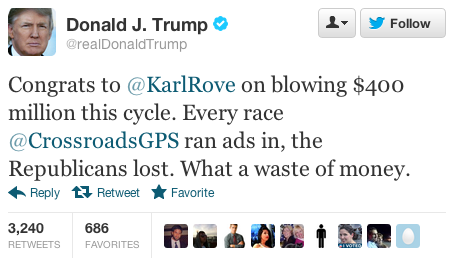Last week I was in Florida, the first time I'd ever been in front of a TV in a real swing state at the end of a presidential election. Given my proclivities, I was looking forward to being pandered to, if briefly (especially if briefly). This is what I got, from Karl Rove's powerhouse SuperPAC American Crossroads:
As someone who consumes 99 percent of my political information in written form (the other one percent is data visualizations), I will admit that I'm far from the target audience, and not especially well-versed in the finer methods of the broadcast TV ad. But really: that's it? After months of being lectured about makers and takers, a suburban housewife asking where's my money? There are no easy buckets on the I-4 corridor; where's the killer instinct?
It's hard to definitively say that the flow of SuperPAC money in the wake of Citizens United failed, but all that dough didn't buy many wins:
But while outside spending affected the election in innumerable ways — reshaping the Republican presidential nominating contest, clogging the airwaves with unprecedented amounts of negative advertising and shoring up embattled Republican incumbents in the House — the prizes most sought by the emerging class of megadonors remained outside their grasp. President Obama will return to the White House in January, and the Democrats have strengthened their lock on the Senate.
American Crossroads, in particular, got pantsed: "Success rates varied dramatically from group to group: American Crossroads and its nonprofit affiliate spent about 6 percent of their funds on winners, while the Service Employees International Union had a 70 percent victory rate, Sunlight found." (The SEIU beat Rove by a factor of 10? That's rough.) This earned Rove one prominent new enemy:

Not every race, but pretty close. As someone, I forget who, put it: "Karl Rove on Fox looked like someone who took a bunch of money from the Mob and didn't deliver."
What happened? Felix Salmon has a compelling argument:
SuperPACs are dumb money. Their cash can almost never be effectively spent, because they’re not on the inside of the campaign. What’s more, because they’re not official campaigns, they always pay top dollar for their TV ad spots, rather than the discounted rates that stations are forced to offer to candidates. The Obama campaign determined, at various points, that if they approached potential donors with the message that Romney had a fundraising lead, that would help Obama raise more money for his own campaign. But the truth was that Romney’s fundraising lead was never particularly useful, because it wasn’t married to a coherent strategy and database. If anything, it just helped Obama raise more cash.
Unlike Salmon, I don't know that it can never be effectively spent. But new money is usually dumb money, and there was a lot of new money this cycle. Natasha Korecki points out that the three biggest recipients of outside money in Illinois house races all lost. Bob Dold spent the most (through mid-October), but he was a pretty good bet as a moderate Republican in a Democratic district, and he only narrowly lost. It would have been a significant win for the GOP, and it made sense to go for it. But just behind Dold was Joe Walsh, whose self-destructive campaign cost $70 per vote.
Citizens United opened the door for a lot of money, so much so that they don't appear to have known what to do with it. That's the next step.


